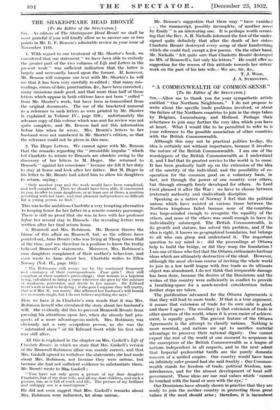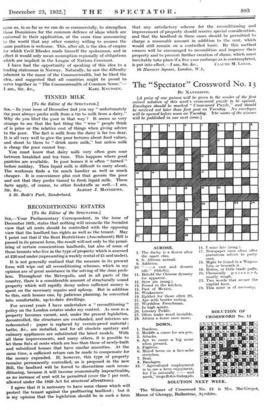"A COMMONWEALTH OF COMMON-SENSE"
[To the Editor of the SPECTATOR.] SIR,—AllOW me to thank you for your sympathetic article entitled "Our Northern Neighbours." I do not propose to write about the specific trade problems involved, or about the failure of the Northern countries to join in the steps taken by Belgium, Luxembourg, and Holland. Perhaps their reluctance to join may further the very idea which you have at heart. What I would like to be permitted to refer to is your reference to the possible association of other countries with the British Commonwealth.
Although this may not be practical politics to-day, the idea is certainly not without importance, because it involves the nature of the British Commonwealth. I am one of the worshippers of the British Commonwealth as I understand it, and I feel that its greatest service to the world is to come. It has been gradually built up on the extension-of the idea of the sanctity of the individual, and the possibility of co- operation for the common good on a voluntary basis, in fact, not through the power of one country over others, but through strength freely developed for others. As Lord Cecil phrased it after the War : we have to choose between (external) authority and (individual) discipline.
Speaking as a native of Norway I feel that the political unions which have existed at various times between the Northern kingdoms failed because none of the countries was large-minded enough to recognize the equality of the others, and none of the others was small enough to have its individuality submerged. The British Commonwealth, in its growth and stature, has solved this problem, and if the idea is right, it knows no geographical boundaries, but belongs to all who can grasp and understand it. The important question to my mind is : did the proceedings at Ottawa help to build the bridge, or did they warp the foundation ? I am one of those who feel that the Ottawa enthusiasts harbour ideas which are ultimately destructive of the ideal. However, although the most obvious course of inviting the whole world to join in a low tariff league with free trade as its ultimate object was abandoned, I do not think that irreparable damage has been done, because the desires of the Dominions and the wishes of this country were sufficiently in conflict to provide a breathing-space for a much-needed consideration before further steps are taken.
The justification' advanced for the Ottawa Agreements is that they will lead to more trade. If that is a true argument, it means that extension of trade for its own sake is good, and there I agree. The corollary is that extension of trade hi other quarters of the world, where it is even easier of achieve- ment, is equally good. The gravest feature of the Ottawa Agreements is the attempt to classify nations. Nothing is more resented, and nations are apt to sacrifice material advantage to preserve their national dignity. One cannot expect the rest of the world at one moment to acquiesce in the conception of the British Commonwealth as a league of nations independent in all respects, and in the next admit that Imperial preferential tariffs are the purely domestic concern of a unified empire. Our country would have been on infinitely safer ground had she said frankly : Our Common- wealth stands for freedom of trade, political freedom, non- interference, and for the utmost development of local self- government. Those ideas are our real values which 'cannot be touched with the hand or seen with the eye.'" Our Dominions have already shown in practice that they are ready to join the mother country in protecting those great values if the need should arise ; therefore, it is incumbent
upon us, in so far as we can do so commercially, to strengthen those Dominions for the common -defence of ideas which are universal in their application, at the same time announcing to the world that any other country willing to assume the same position is welcome. This, after all, is the idea of empire for which Cecil Rhodes made himself the spokesman, and in effect it would only mean assumption regionally of obligations which are implicit in the League of Nations Covenant.
I have had the opportunity of speaking of this idea to a leading statesman in Norway. Naturally, he saw the difficulty inherent in the name of the Commonwealth, but he liked the idea,. and suggested that all countries might be proud to serve together in "The Commonwealth of Common Sense."--



























 Previous page
Previous page